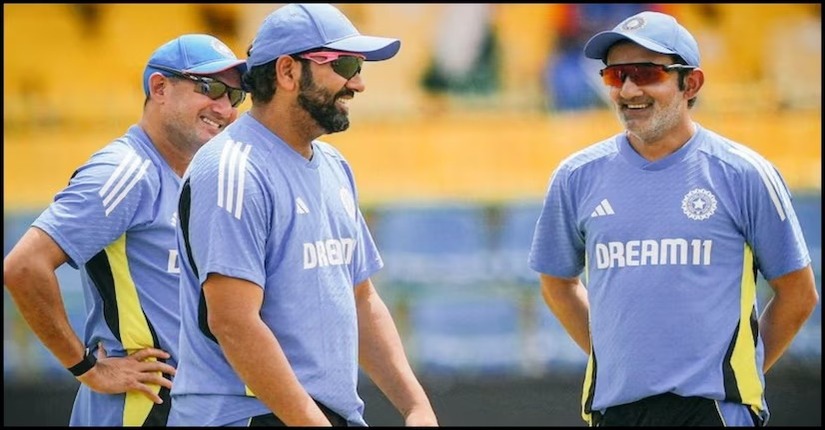Gautam Gambhir’s recent BCCI meeting has shook discussions about the future of Indian cricket. Known for his frankness, Gambhir provided valuable insights into various aspects of the sport. He shared his views on refining domestic cricket, prioritizing player welfare, and embracing modern coaching. Let’s break down the key points he discussed.
1. Reforming Domestic Cricket
Gambhir emphasized the importance of strengthening India’s domestic cricket structure. He highlighted on providing more opportunities for young talent to succeed. According to him, tournaments like the Ranji Trophy must receive more attention and resources. He stated that domestic cricket is the foundation of India’s future of cricket, and the BCCI needs to revitalize it. He also mentioned that the dominance of the IPL often undermines the importance of traditional domestic competitions. The IPL, while beneficial in certain ways, should not overshadow grassroots cricket development. Gambhir’s call for a better, more structured domestic framework was a clear message for the BCCI to invest in India’s cricket future from the ground up.
2. Player Welfare and Mental Health
Gambhir focused on the importance of looking after players’ mental health and well-being. He noted the increasing mental strain caused by constant playing pressure. Gambhir pointed out that the BCCI should create better support systems for players who face mental challenges. He also shared his own experience, acknowledging how mental health struggles can go unnoticed. Gambhir’s call for more breaks, counseling, and psychological support for players resonated with many. He believes that mental well-being should be prioritized alongside physical recovery. This would help players focus better on the game without compromising their health. His candid remarks reflect the evolving conversation around player supervision in international cricket.
3. Youth Development Programs
Gambhir stressed the need for focused youth development programs. He urged the BCCI to scout talent at an earlier stage. By partnering with schools and local academies, the BCCI can identify promising cricketers early. Gambhir suggested that specialized camps and regular talent assessments could cultivate young athletes. This would ensure that future generations are prepared for international cricket. He advocated for an emphasis on holistic development, focusing on both skill and mindset. Ensuring young cricketers are well-rounded individuals would lead to more successful international players. Gambhir believes early intervention can create the right environment for youth to flourish and succeed at the highest levels.
4. Modern Leadership and Coaching Models
Gambhir called for the adoption of modern leadership and coaching role models within Indian cricket. He believes in evolving with the times and adapting new strategies. Gambhir emphasized that effective leadership is about fostering communication, trust, and collaboration. He pointed out that today’s cricket requires more than just tactical knowledge; managing player personalities is crucial. Gambhir advocated for coaching that goes beyond traditional methods, incorporating innovative techniques to enhance player performance. With changing cricket dynamics, he urged the BCCI to bring in fresh perspectives. He suggested that modern coaching practices and diverse leadership styles could improve team performance unforgettably and build a more resilient team culture.
5. The IPL’s Role in Indian Cricket
While Gambhir has been outspoken about his concerns with the IPL, he acknowledged its importance in showcasing talent. He believes the IPL offers Indian cricketers a unique platform to compete globally. However, he warned that the competition should not overshadow other important cricket formats. The IPL is beneficial but should not dominate the calendar to the harm of international or domestic cricket. Gambhir highlighted that balancing IPL with other formats is key to maintaining the well-being of Indian cricket. It is essential that the BCCI ensures a well-rounded schedule for players. By doing so, the integrity of the domestic circuit and international cricket remains unharmed.
6. BCCI’s Accountability and Governance
Gambhir called for greater accountability and transparency from the BCCI. He pointed out that the board should be more open in its decision-making. According to him, explicit governance structures could lead to better long-term planning for Indian cricket. He emphasized that the BCCI must hold officials accountable for their actions. A transparent board would foster better relationships with players, fans, and stakeholders. Gambhir also expressed his concerns about the influence of politics within cricket administration. He believes that removing unnecessary rules and regulations will improve the cricket environment. Transparent and focused leadership at the BCCI level is essential for the success of Indian cricket that persists.
Conclusion
Gautam Gambhir’s meeting with the BCCI sheds light on several areas requiring attention within Indian cricket. His insights on domestic reform, mental health, youth development, leadership, and accountability resonate deeply with cricket lovers. As one of India’s most respected cricketers, Gambhir’s suggestions could serve as a blueprint for the future of the game. His forthright approach highlights the need for structural changes within the system to ensure that India’s cricket legacy continues to thrive. Gambhir’s call for better governance, player support, and balanced playing schedules can help Indian cricket navigate challenges and stay at the top of the global game.

